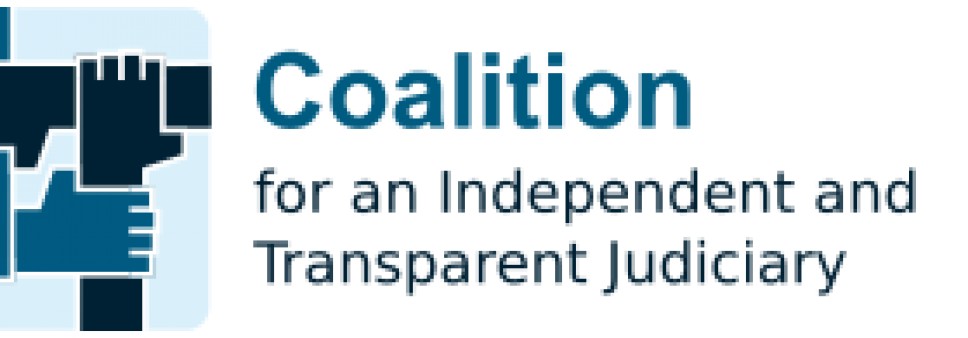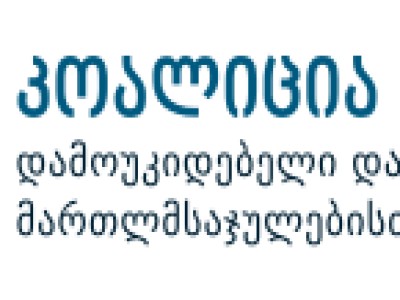The Coalition finds the Conference Held on March 24th Damaging to the European Integration Process
The Coalition for Independent and Transparent Judiciary reacts to the developments at the XXXII Conference of Judges held on March 24th, including the re-election of influential judges - Levan Tevzadze, Vasil Mshvenieradze, and Nikoloz Marsagishvili as members of the Council. As anticipated, the influential group of judges used the conference as an instrument to undermine the idea of integrity checks advocated by the European Commission and discredit individual judges. At the same time, the rotation of Clan members in key managerial positions persisted.
The first topic discussed by the Conference was the European Commission's recommendation regarding integrity checks of judges. The influential group[1] provided misleading information about this recommendation to the judges in attendance. The Clan assessed the integrity check mechanism as a mechanism for purging the entire judiciary. In reality, the recommendation involves verifying the integrity of a specific group of judges: the Council members, Supreme Court judges, and court presidents. The purpose of integrity checks is the formation of independent courts.
The influential group further urged attending judges to endorse a statement issued by the Supreme Court Plenum on March 11, 2024, which opposes the introduction of the integrity checks mechanism.[2] The speeches also targeted judges who had previously publicly disagreed with the Clan's position on integrity checks. Once again, no dissenting opinion was expressed at the conference, and the majority of judges present supported the statement.
The second significant item on the agenda was the election of members and the Secretary of the High Council of Justice. The term of Council Secretary Nikoloz Marsagishvili was ending, and the positions of two members, Paata Silagadze and Badri Shonia, had to be filled after they left their positions to participate in the competition announced for the vacant positions of the Supreme Court. This resignation reinforces the unclear practice of premature termination of the office of Council members.[3]
It is regrettable that the election of Council members occurred in a non-competitive environment, and that the Judicial Conference was used to undermine the idea of improving the judiciary and the country’s integration with the European Union. Furthermore, the candidates did not present their views regarding the current situation and challenges in the justice system. Additionally, the trend of appointing members of the influential group of judges to managerial positions was reinforced. Out of 292 judges participating in the voting, 279 voted for Levan Tevzadze,[4] 281 for Vasil Mshvenieradze,[5] and 284 for Nikoloz Marsagishvili.[6] The latter was re-elected by the Conference as the Council Secretary, even though the state of transparency in the Council deteriorated sharply during his tenure as a secretary. Notably, all three individuals have served as members of the Council at various times and have held significant managerial positions within the justice system for several years.
Top of Form
The monitoring of elections of judge members to the Council has revealed that only representatives of the influential group of judges or individuals trusted by them have a chance of joining this body. Moreover, the Clan, through misinformation, seeks to garner support from the entire judicial system, thereby reinforcing the already established informal hierarchy.
The Conference of Judges is an important format of judicial self-governance, where professional discussion takes place and diverse opinions and arguments are exchanged. Regrettably, for years, the Conference has not contributed to improvements in the justice system but rather to strengthening the interests of the influential group of judges. Typically, judges attending the Conference automatically vote for candidates nominated for specific positions.
Top of Form
Unfortunately, March 24 once again demonstrated that the Judges' Conference was not intended to protect the interests of the judiciary and empower individual judges. Instead, it was aimed at showcasing an illusory unity concealing the interests of the Judicial Clan and the government.
[1] Nino Kadagidze, Levan Murusidze, Giorgi Mikautadze, Lavrenti Maghlakelidze and Dimitri Gvritishvili.
[2] Supreme Court Plenum Statement, Supreme Court website, 11 March 2024, available at: https://www.supremecourt.ge/ka/news/gantskhadeba (Acessed:25.03.24)
[3] According to Paragraph 16 of Article 341 of the Organic Law of Georgia "On Common Courts," the legislation stipulates that a candidate who is also a member of the Council should not take part in the candidate assessment (including the evaluation of candidates, voting, and participation in interviews).
[4] The High Council of Justice, Levan Tevzadze, available at: https://shorturl.at/xyFGL (Accessed: 26.03.24).
[5] Tbilisi City Court, Vasil Mshvenieradze, available at: https://tcc.court.ge/Justice/Details/226 (Accessed:26.03.24).
[6] The High Council of Justice, Nikoloz Marsagishvili, available at: https://shorturl.at/pqvzN (Accessed: 16.03.24).


